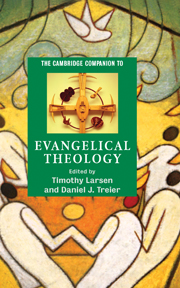Book contents
- Frontmatter
- 1 Defining and locating evangelicalism
- Part I: Evangelicals and Christian doctrine
- 2 The triune God of the gospel
- 3 Scripture and hermeneutics
- 4 Jesus Christ
- 5 The human person in the Christian story
- 6 Justification and atonement
- 7 The Holy Spirit
- 8 Conversion and sanctification
- 9 The church in evangelical theology and practice
- Part II: The contexts of evangelical theology
- Index
9 - The church in evangelical theology and practice
from Part I: - Evangelicals and Christian doctrine
Published online by Cambridge University Press: 28 September 2007
- Frontmatter
- 1 Defining and locating evangelicalism
- Part I: Evangelicals and Christian doctrine
- 2 The triune God of the gospel
- 3 Scripture and hermeneutics
- 4 Jesus Christ
- 5 The human person in the Christian story
- 6 Justification and atonement
- 7 The Holy Spirit
- 8 Conversion and sanctification
- 9 The church in evangelical theology and practice
- Part II: The contexts of evangelical theology
- Index
Summary
When Christmas Day fell on a Sunday in 2005, a minor religious and cultural furor erupted, as reported by American news organizations, when several leading evangelical churches decided to cancel their Sunday morning worship services. This was because Christmas was a “family day,” said church spokespersons. One leader observed that it would not be “convenient” for parents to have to deal with excitable children, have Christmas breakfast, and then change clothes and come to church. After all, people could go to one of the scheduled Christmas Eve services - there was nothing special about Sunday.
What aroused the most comment on this story was the fact that these were evangelical churches-accustomed to bearing the torch of conserving cultural and religious traditions, not discarding them. So, this event was a particular shock to cultural observers. But what was also interesting, yet unacknowledged by editorialists on the front pages of newspapers, was the ecclesiology that such an action revealed, at least among American evangelicals.
This chapter will explore this broad question via historical, descriptive, and constructive approaches. I will propose a version of a renewed evangelical ecclesiology that has continuity with evangelical history and articulates both a broad theological vision and practical fruitfulness.
- Type
- Chapter
- Information
- The Cambridge Companion to Evangelical Theology , pp. 125 - 142Publisher: Cambridge University PressPrint publication year: 2007
- 4
- Cited by

